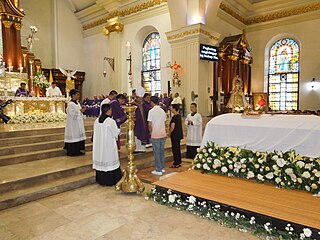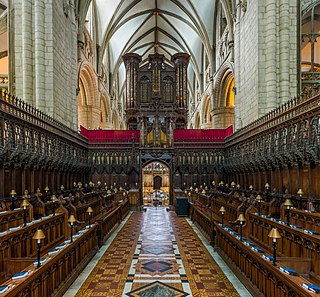Related Research Articles

A Requiem or Requiem Mass, also known as Mass for the dead or Mass of the dead, is a Mass of the Catholic Church offered for the repose of the soul or souls of one or more deceased persons, using a particular form of the Roman Missal. It is usually celebrated in the context of a funeral.

Herbert Norman Howells was an English composer, organist, and teacher, most famous for his large output of Anglican church music.

The Messa da Requiem is a musical setting of the Catholic funeral mass (Requiem) for four soloists, double choir and orchestra by Giuseppe Verdi. It was composed in memory of Alessandro Manzoni, whom Verdi admired, and therefore also referred to as the Manzoni Requiem. The first performance, at the San Marco church in Milan on 22 May 1874, conducted by the composer, marked the first anniversary of Manzoni's death. It was followed three days later by the same performers at La Scala. Verdi conducted his work at major venues in Europe.
In Anglican church music, a service is a musical setting of certain parts of the liturgy, generally for choir with or without organ accompaniment.

Howard Lindsay Goodall is an English composer of musicals, choral music and music for television. He also presents music-based programmes for television and radio, for which he has won many awards. In May 2008, he was named as a presenter and "Composer-in-Residence" with the UK radio channel Classic FM. In May 2009, he was named "Composer of the Year" at the Classic BRIT Awards.

Sir Alfred Herbert Brewer was an English composer and organist. As organist of Gloucester Cathedral from 1896 until his death, he contributed a good deal to the Three Choirs Festival for 30 years.
Francisco Valls or Francesc Valls was a Spanish composer, theorist and mestre de capella. Among his most known works are the mass Missa Scala Aretina and tract Mapa Armónico Práctico.

John Rutter's Requiem is a musical setting of parts of the Latin Requiem with added psalms and biblical verses in English, completed in 1985. It is scored for soprano, mixed choir and orchestra or chamber ensemble.
Hymnus Paradisi is a choral work by Herbert Howells for soprano and tenor soloists, mixed chorus, and orchestra. The work was inspired in part by the death from polio of his son Michael in 1935. Howells wrote the work from 1936 to 1938, drawing on material from the then-unpublished Requiem of 1932, but then retained the music privately, without public performance. Howells maintained later in life that Ralph Vaughan Williams convinced him to allow the work to be performed publicly at the Three Choirs Festival. However, his former pupil and biographer Paul Spicer contends that Howells first showed the music to Herbert Sumsion, organist of Gloucester Cathedral, who in turn showed it to Gerald Finzi, and that only after these two expressed their enthusiasm did Howells show the music to Vaughan Williams. The title 'Hymnus Paradisi' was suggested by Sumsion. The work received its successful premiere at the Festival in 1950. The score was published in 1951.
A World Requiem, Op. 60 is a large-scale symphonic work with soloists and choirs by the British composer John Foulds. Written as a requiem and using forces similar in scale to Gustav Mahler's Eighth Symphony, the work calls for a full symphony orchestra, soloists, massed choirs including children's choirs, offstage instrumentalists and an organ.

Psalm 42, Op. 42 Wie der Hirsch schreit is a cantata by Felix Mendelssohn, setting Psalm 42 in German. It was written and published in 1837 for soloists, mixed choir and orchestra.

Max Reger's 1915 Requiem, Op. 144b, is a late Romantic setting of Friedrich Hebbel's poem "Requiem" for alto or baritone solo, chorus and orchestra. It is Reger's last completed work for chorus and orchestra, dedicated in the autograph as Dem Andenken der im Kriege 1914/15 gefallenen deutschen Helden.

The Reger-Chor is a German-Belgian choir. It was founded in Wiesbaden in 1985 and has been conducted by Gabriel Dessauer in Wiesbaden. Since 2001 it has grown to Regerchor-International in a collaboration with the organist Ignace Michiels of the St. Salvator's Cathedral of Bruges. The choir performs an annual concert both in Germany and Belgium of mostly sacred choral music for choir and organ. Concerts have taken place regularly in St. Bonifatius, Wiesbaden, and in the cathedral of Bruges in its series "Kathedraalconcerten". The choir performed additional concerts at other churches of the two countries and in the Concertgebouw of Bruges.
Edward Howell, FRAM was a British cellist and music professor of the late 19th century. He studied cello at the Royal Academy of Music in London later becoming professor of cello at the Royal College of Music, the Royal Academy of Music and the Guildhall School of Music in London.
Music for the Requiem Mass is any music that accompanies the Requiem, or Mass for the Dead, in the Catholic Church. This church service has inspired hundreds of compositions, including settings by Victoria, Mozart, Berlioz, Verdi, Fauré, Dvořák, Duruflé and Britten. For centuries settings of the Mass for the Dead were to be chanted in liturgical service monophonically. Later the settings became polyphonic, Victoria's famous 1605 a cappella work being an example. By Mozart's time (1791) it was standard to embed the dramatic and long Day of Wrath sequence, and to score with orchestra. Eventually many settings of the Requiem, not least Verdi's (1874), were essentially concert pieces unsuitable for church service.
The Lord Is My Shepherd is a sacred choral composition by John Rutter, a setting of Psalm 23. The work was published by Oxford University Press in 1978. Marked "Slow but flowing", the music is in C major and 2/4 time. Rutter composed it for Mel Olson and the Chancel Choir of the First United Methodist Church in Omaha, Nebraska. He later included the work as a movement in his Requiem of 1985, then with orchestra or chamber ensemble. In 1993, Rutter also made it part of his Psalmfest, a collection of nine psalms written over 20 years. For that version, he used also soloists.

The Magnificat and Nunc dimittis for St Paul's Cathedral, also known as the St Paul's Service, is a setting by the English composer Herbert Howells of the Magnificat and Nunc dimittis for the Anglican service of Evensong. Scored for four-part choir and organ, it was written in 1950 for St Paul's Cathedral in London.

The Magnificat and Nunc dimittis for Gloucester Cathedral, also known as the Gloucester Service, is a setting by the English composer Herbert Howells of the Magnificat and Nunc dimittis for the Anglican service of Evensong. Scored for four-part choir and organ, it was written in 1946 for Gloucester Cathedral. It was published by Novello in 1947.

In Exile is a motet by Herbert Sumsion, who was for decades organist at Gloucester Cathedral. He set in 1981 a biblical text from Psalm 137 in English, beginning "By the waters of Babylon", scored for double choir a cappella. The motet was published by Basil Ramsey.

Collegium Regale is a collection of choral settings by the English composer Herbert Howells of the canticles for the Anglican services of Mattins, Holy Communion and Evening Prayer. Scored for four-part choir, solo tenor and organ, the pieces were written between 1944 and 1956 "for the King's College, Cambridge". The first of the pieces were first published by Novello in 1947, and they have become a popular piece of music in the Anglican church music repertoire.
References
- ↑ "Requiem programme notes" . Retrieved 13 March 2022.
- ↑ Sargent, Joseph (Autumn 2017). "Howells's depersonalised Requiem". The Musical Times. 158 (1940). Musical Times Publications Ltd.: 65–93. JSTOR 44862825.
- ↑ Howells, Herbert (1981). Requiem. London: Novello. ISBN 0-85360-694-3.